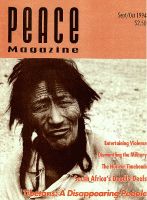
Peace Magazine Sep-Oct 1994, page 27. Some rights reserved.
Search for other articles by Petra Kelly here
Review
One of our great losses of 1992 was the death of Green Party founder, visionary, and prophet of nonviolence, Petra Karin Kelly. Among the party and human rights activities she leaves behind is this inspirational collection of her public dialogues from 1990 to her death.
In the New World Order, where might continues to make right, Petra Kelly was a wind of peace and compassion in the Western political realm. This book is highly recommended for those in need of inspiration to continue the struggle.
Her definition of Green politics was the use of political power to speak, with passion, for the voiceless. Here is what she wrote:
I coined the term "anti-party party" for the Greens-trying to express that new kind of power (counterpower) that we are all speaking about. This is a power that is common to all, to be used by all, for all. "Power over" is to be replaced by "shared power," by "the power to do things," by the discovery of our own strength as opposed to a passive receiving of power exercised by others, often in our name. It is not power to dominate-not power to terrorize or to oppress-but the power of nonviolent change.
Where do we begin with nonviolent transformation? Consider just one example. We are correct in stating that a lifestyle and methods of production which rely on an endless supply of raw materials and which use those raw materials lavishly also furnish the motive for the violent appropriation of raw materials from other countries. In contrast, a responsible use of raw materials, as part of an ecologically oriented lifestyle and economy, reduces the risk that policies of violence will be pursued in our name. Thus we must learn that we can begin by reducing our consumption of goods to where we do not provide a market for big business.
We can reduce our consumption of goods to where we will use only our share of the world's resources, not taking what belongs to someone else.
A truly free society must also mean a guarantee of economic, social, and individual human rights. Regardless of country of ideology, regardless of where human rights are violated, we must stand up and never ever be silent when it comes to helping those who are oppressed.
A truly free society must not include a "peace" which oppresses us. We must learn on our own terms what peace and freedom mean together. There can be no peace if there is social injustice and suppression of human rights, because external and internal peace are inseparable. Peace ... is not just the absence of mass destruction, but a positive internal and external condition in which people are free so that they can grow to their full potential.
We must build ecological alliances and get rid of and ban all military alliances. We are at the beginning of creating a global culture of ecological responsibility and we must start to establish binding principles governing ecological relations among all countries.
Most important of all, we must begin to give higher priority to social and environmental issues than to military ones. Cancelling one nuclear weapon test could provide the money for the installation of eighty thousand hand pumps that would give many Third World villages access to safe water. The money for one Trident submarine could provide a five year immunization program for children against six deadly diseases, preventing one million deaths per year.
Finally, global Green politics must give people hope that a future without the use of force is possible. This is not a utopian dream. As the abolition of slavery changed from once seeming unrealistic to becoming a normal state, so too can radical disarmament come to be the norm of international affairs."
Nonviolence Speaks to Power is available for U.S. $5 from the Center for Global Nonviolence Planning Project, Spark M. Matsunaga Institute for Peace, University of Hawaii, Honolulu, 96822.
The Center for Global Nonviolence Planning Project was established within the University of Hawaii's Institute for Peace to conduct research on nonviolent global cultural resources, facilitate seminars on the theory and practice of nonviolence, and provide a consultative resource to assist nonviolent transformation at the local to global level. Nonviolence Speaks to Power is just one of several publications offered by both the Center and the Institute. The book was one of Petra Kelly's last projects, and advance copies were in the mail to her at the time of her death.
Reviewed by Yeshua Moser, Political Struggle and Human Rights Animator at Nonviolence International's Southeast Asia office, Bangkok, Thailand.

Peace Magazine Sep-Oct 1994, page 27. Some rights reserved.
Search for other articles by Petra Kelly here